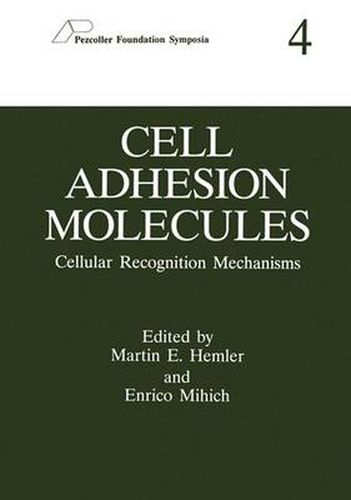Readings Newsletter
Become a Readings Member to make your shopping experience even easier.
Sign in or sign up for free!
You’re not far away from qualifying for FREE standard shipping within Australia
You’ve qualified for FREE standard shipping within Australia
The cart is loading…






This title is printed to order. This book may have been self-published. If so, we cannot guarantee the quality of the content. In the main most books will have gone through the editing process however some may not. We therefore suggest that you be aware of this before ordering this book. If in doubt check either the author or publisher’s details as we are unable to accept any returns unless they are faulty. Please contact us if you have any questions.
The Fourth Annual Pezcoller Symposium entitled Adhesion Molecules: Cellular Recognition Mechanisms was held in Rovereto, Italy, June 24-26, 1992 and was focussed on the detailed mechanisms whereby cells utilize certain integral membrane proteins to perceive their surrounding environment and interact with it. With timely presentations and stimulating discussions this Symposium addressed the genetics and biochemistry of adhesion molecules, the regulation of their functions and their role in cancer and the immune system. Emphasis was given to adhesion proteins in the integrin family because of the widespread distribution of this group of molecules and its important role in essentially all eukaryotic biological systems. The regulation of integrin genes and their expression are discussed in detail, as are specific aspects of the genetics of fibronectin. The molecular basis for the regulation of certain integrins, the function of these proteins in determining cell adhesion, and the consequences of this adhesion for the function of the cells involved are discussed. The role of certain integrins in stimulating signal transduction, the essential involvement of integrins in conditioning the function of T and NK cells function, the heterogeneity of integrins and its biological consequences, and the role of cell adhesion molecules in tumor cells invasion and metastases are all extensively analyzed. New information was presented on the role of CD44 and splice variants in normal differentiation and tumor progression.
$9.00 standard shipping within Australia
FREE standard shipping within Australia for orders over $100.00
Express & International shipping calculated at checkout
This title is printed to order. This book may have been self-published. If so, we cannot guarantee the quality of the content. In the main most books will have gone through the editing process however some may not. We therefore suggest that you be aware of this before ordering this book. If in doubt check either the author or publisher’s details as we are unable to accept any returns unless they are faulty. Please contact us if you have any questions.
The Fourth Annual Pezcoller Symposium entitled Adhesion Molecules: Cellular Recognition Mechanisms was held in Rovereto, Italy, June 24-26, 1992 and was focussed on the detailed mechanisms whereby cells utilize certain integral membrane proteins to perceive their surrounding environment and interact with it. With timely presentations and stimulating discussions this Symposium addressed the genetics and biochemistry of adhesion molecules, the regulation of their functions and their role in cancer and the immune system. Emphasis was given to adhesion proteins in the integrin family because of the widespread distribution of this group of molecules and its important role in essentially all eukaryotic biological systems. The regulation of integrin genes and their expression are discussed in detail, as are specific aspects of the genetics of fibronectin. The molecular basis for the regulation of certain integrins, the function of these proteins in determining cell adhesion, and the consequences of this adhesion for the function of the cells involved are discussed. The role of certain integrins in stimulating signal transduction, the essential involvement of integrins in conditioning the function of T and NK cells function, the heterogeneity of integrins and its biological consequences, and the role of cell adhesion molecules in tumor cells invasion and metastases are all extensively analyzed. New information was presented on the role of CD44 and splice variants in normal differentiation and tumor progression.